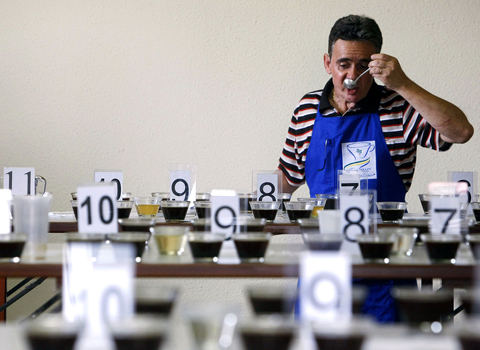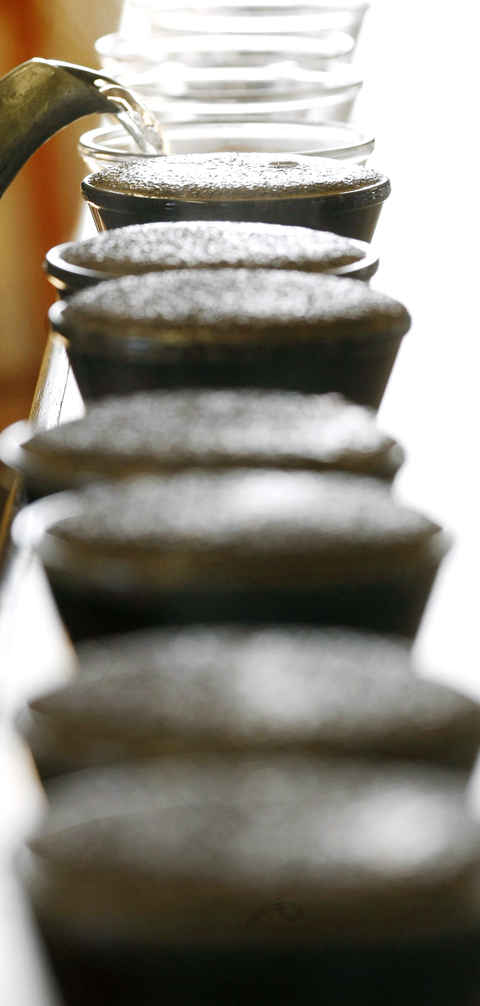Some of the coffee world’s most discerning palettes came together in the heart of Brazil’s coffee belt on Friday to judge which brews in the world’s top grower are best for an expanding specialty market.
After hours of painstaking swilling, spitting and note making this week, judges at the Brazilian round of the international Cup of Excellence competition whittled the field down to 11 finalists from 56 entries.
The judges said the quality of Brazilian coffee had improved this year despite a wet harvest period that spoiled large quantities of produce in the world’s top grower.

PHOTO: REUTERS
“I honestly think the quality is much better this year. A lot of people told me quality would be lower because of the rains, but the top-tier coffees are presenting much better characteristics than in other years,” chief judge Erwin Mierisch said.
Cup of Excellence, sponsored in Brazil by the export promotion agency APEX, holds annual competitions to seek South and Central America’s best produce. It aims to expand the market for high quality coffee to give growers the incentive to produce better beans.
Begun a decade ago to counter the perception that Brazil had little to offer beyond its large supply of bulk coffee, it has spread to other producers in the region. East African nation Rwanda now also takes part.

PHOTO: REUTERS
Judges paced up and down with silver spoons, sampling the line of coffees, each of which had been roasted for the same time and at the same temperature and ground in a machine cleaned repeatedly to avoid contamination. Their faces gave nothing away as they made notes in silence before moving on to the next sample.
“I immediately spotted one which was outstanding. I gave it a 97 score,” out of a possible 100, said Vytautas Kratulis, director of Sviezia Kava, a roaster in Lithuania after the cupping process ended.
He also preferred this year’s coffees over last year’s. Still, he said he expected quality coffee would be in shorter supply in his country this year and at higher costs. The global economic crisis has hit Baltic states particularly hard, making Lithuanian coffee drinkers reluctant to pay premium prices.
Judges drifted out of the sampling room, mouths tired after forcefully drawing coffees dozens of times from the spoon with loud rasps, and congregated to discuss the qualities of each entry.
Numbers eight and 11 emerged as two potential winners. Judges compared their flavors to fruits like pineapple or red berries, while others were more often likened to chocolate or savory flavors like butter.
Judges laughed as one peer described a coffee as having a “taco” taste and another’s acidity as “polite, not aggressive.”
Coffee number eight emerged a fraction of a point ahead of 11 at the award ceremony on Friday night. The grower, Candido Rosa, was from Bahia in the northeast, a hotter, drier state than where most of the moisture-loving trees grow in Brazil.
He was presented with a plaque made with coffee beans.
Japanese coffee roaster Yuko Itoi, who has traveled to other rounds of the contest in Nicaragua, Colombia, Bolivia and Guatemala as well as Brazil this year, said the Cup of Excellence label was increasingly recognized back at home.
“Little by little, we can now see Cup of Excellence coffee in famous department stores and coffee stores,” she said.
Japan is often one of the main buyers in the online auctioning of the winning and runner up coffees in the Brazilian round, which will take place on Jan. 19.
Itoi said Japanese consumers had a soft spot for Brazilian coffee, even though not an elite origin like Colombia or Guatemala, because their countrymen had helped make Brazil into the world’s biggest producer.
“For Japan, Brazil coffee has a very special position because we immigrated 100 years ago” to farm it in Brazil, she said.

SECURITY: As China is ‘reshaping’ Hong Kong’s population, Taiwan must raise the eligibility threshold for applications from Hong Kongers, Chiu Chui-cheng said When Hong Kong and Macau citizens apply for residency in Taiwan, it would be under a new category that includes a “national security observation period,” Mainland Affairs Council (MAC) Minister Chiu Chui-cheng (邱垂正) said yesterday. President William Lai (賴清德) on March 13 announced 17 strategies to counter China’s aggression toward Taiwan, including incorporating national security considerations into the review process for residency applications from Hong Kong and Macau citizens. The situation in Hong Kong is constantly changing, Chiu said to media yesterday on the sidelines of the Taipei Technology Run hosted by the Taipei Neihu Technology Park Development Association. With

CARROT AND STICK: While unrelenting in its military threats, China attracted nearly 40,000 Taiwanese to over 400 business events last year Nearly 40,000 Taiwanese last year joined industry events in China, such as conferences and trade fairs, supported by the Chinese government, a study showed yesterday, as Beijing ramps up a charm offensive toward Taipei alongside military pressure. China has long taken a carrot-and-stick approach to Taiwan, threatening it with the prospect of military action while reaching out to those it believes are amenable to Beijing’s point of view. Taiwanese security officials are wary of what they see as Beijing’s influence campaigns to sway public opinion after Taipei and Beijing gradually resumed travel links halted by the COVID-19 pandemic, but the scale of

A US Marine Corps regiment equipped with Naval Strike Missiles (NSM) is set to participate in the upcoming Balikatan 25 exercise in the Luzon Strait, marking the system’s first-ever deployment in the Philippines. US and Philippine officials have separately confirmed that the Navy Marine Expeditionary Ship Interdiction System (NMESIS) — the mobile launch platform for the Naval Strike Missile — would take part in the joint exercise. The missiles are being deployed to “a strategic first island chain chokepoint” in the waters between Taiwan proper and the Philippines, US-based Naval News reported. “The Luzon Strait and Bashi Channel represent a critical access

Pope Francis is be laid to rest on Saturday after lying in state for three days in St Peter’s Basilica, where the faithful are expected to flock to pay their respects to history’s first Latin American pontiff. The cardinals met yesterday in the Vatican’s synod hall to chart the next steps before a conclave begins to choose Francis’ successor, as condolences poured in from around the world. According to current norms, the conclave must begin between May 5 and 10. The cardinals set the funeral for Saturday at 10am in St Peter’s Square, to be celebrated by the dean of the College